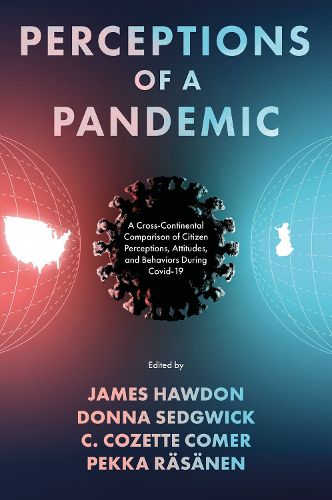Readings Newsletter
Become a Readings Member to make your shopping experience even easier.
Sign in or sign up for free!
You’re not far away from qualifying for FREE standard shipping within Australia
You’ve qualified for FREE standard shipping within Australia
The cart is loading…






While responses to the Covid-19 pandemic varied based on the timing of the onset of cases and the severity of the disease, Perceptions of a Pandemic analyzes and compares the perceptions and attitudes of citizens in the US and Finland during the pandemic's early stages and relates these to health and wellbeing outcomes after the pandemic ended.
With findings based on rich survey data from 1,500 Americans and 1,500 Finns, this study provides a unique contrast between systems of government, welfare approaches, levels of trust, and other factors that shape the citizenry's relationship with their government and social institutions across continents. What behaviors - from teleworking to media consumption to mask wearing - changed? What attitudes, such as trust in institutions and confidence in science, patterned these behaviors and any changes that occurred in them? How were these factors reflected in opinions on related policies?
Bridging sociology and public policy, this deeply insightful work challenges us to confront the issues and challenges that we need to consider before the next global health crisis emerges.
$9.00 standard shipping within Australia
FREE standard shipping within Australia for orders over $100.00
Express & International shipping calculated at checkout
While responses to the Covid-19 pandemic varied based on the timing of the onset of cases and the severity of the disease, Perceptions of a Pandemic analyzes and compares the perceptions and attitudes of citizens in the US and Finland during the pandemic's early stages and relates these to health and wellbeing outcomes after the pandemic ended.
With findings based on rich survey data from 1,500 Americans and 1,500 Finns, this study provides a unique contrast between systems of government, welfare approaches, levels of trust, and other factors that shape the citizenry's relationship with their government and social institutions across continents. What behaviors - from teleworking to media consumption to mask wearing - changed? What attitudes, such as trust in institutions and confidence in science, patterned these behaviors and any changes that occurred in them? How were these factors reflected in opinions on related policies?
Bridging sociology and public policy, this deeply insightful work challenges us to confront the issues and challenges that we need to consider before the next global health crisis emerges.